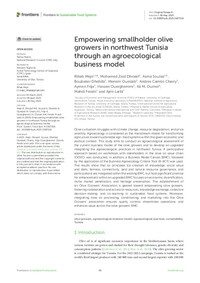Empowering smallholder olive growers in northwest Tunisia through an agroecological business model

Authors:
Olive cultivation struggles with climate change, resource degradation, and price volatility. Agroecology is considered as the mainstream model for transforming agriculture toward sustainable agri-food systems within the given economic and political context. This study aims to conduct an agroecological assessment of the current business model of the olive growers and to develop an upgraded integrating the agroecological practices in northwest Tunisia. A participative approach based on workshops with stakeholders in the olive oil value chain (OOVC) was conducted. In addition, a Business Model Canvas (BMC), followed by the application of the Business Agroecology Criteria Tool (B-ACT) was used. The results show that six principles (co-creation of knowledge, social value and diets, fairness, connectivity, land and natural resource governance, and participation) are integrated within the existing BMC, but hold significant promise for enhancement within an upgraded BMC focuses on economic diversification, niche market penetration, and heritage preservation. The establishment of an Olive Growers' Association is geared toward empowering olive growers, fostering collaboration and access to resources, knowledge exchange, collective decision-making, and co-learning in sustainable food systems. Moreover, integrating olive oil processing, conditioning, and marketing into the Olive Growers' association ensures quality control, streamlines operations, and enhances value across the olive growers' BMC.
